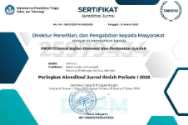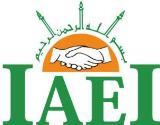Abdillah, Wahyu. & Herawati, Andry. (2018). “Pengaruh Bauran Pemasaran (7P) Terhadap Pengambilan Keputusan Siswa Dalam Memilih Sekolah Berbasis Enterpreneur (Studi Pada SMA Muhammadiyah 9 Surabaya)”, Jurnal JIABI, 2(2), 309-325.
Muin, Abdul., Agniah, Miftahul. (2022). “Sistem Dan Prosedur Cicil Emas Pada Bank Syariah Indonesia Kantor Cabang Pembantu Jatibarang”. JSEF, 1(2), 113-118.
Agustini, Ni Ketut Yulia. (2003). “Segmentasi Pasar, Penentuan Target Dan Penentuan Posisi”. Equilibrium, Jurnal Ekonomi-Manajemen-Akuntansi, I(2), 91-106.
Amiyati, Dwi Rara., Fuadl, Ahmad., & Sinaga, Asmawarna. (2022). “Pelaksanaan Multi Akad (Murabahah dan Rahn) Pada Produk Cicil Emas Menurut Fatwa DSN MUI Pada PT. Bank Sumut Syariah Cabang Stabat”. Mediation: Journal Of Law, 1(1), 55-65.
Apriyani, Hana. & Sulistiadi, Wahyu. (2022). “Peranan Segmenting, Targeting, Positioning Sebagai Strategi Pemasaran Rumah Sakit di Indonesia”. Jurnal MPPKI, 5(3), 233-238.
Ferdinand, Daniel Reven Augusty. (2017). “Analisis Pengaruh Desain Produk, Kualitas Produk, Harga Kompetitif, Dan Citra Merek Terhadap Keputusan Pembelian (Studi PadaPelanggan Nesty Collection Jakarta)”, Diponegoro Journal Of Management, 6(3), 1-13.
Budiman, Johny., Yulfiswandi., Ellen., Jasmine, Florentina., Kelvin., & Vernando, Lovis. (2023). “Peluang Investasi Emas Jangka Panjang Melalui Produk Cicil Emas BSI”. JPEK: Jurnal Pendidikan Ekonomi dan Kewirausahaan, 7(1) , 14– 23.
Damayanti., Ambardi., Pakkanna, Mukhaer. (2020). Analisis Komparasi Pengaruh Model Aida Terhadap Keputusan Nasabah Menggunakan Produk Cicilan Emas Pada Dua Kantor Cabang Bank Syariah Mandiri. Jurnal Riset Akuntansi dan Manajemen, 9 (2), 123-132.
Douissa, I. B. (2019). Factors Affecting College Students’ Multidimensional Financial Literacy in the Middle East. International Review of Economics Education, 100-173.
Indriani, Reka., & Habib, Muhammad Alhada Fuadillah. (2022). “Pelaksanaan Gadai Dan Cicil Emas di Bank Syariah Indonesia KCP Malang Kepanjen 1 Dalam Perspektif PerbankanSyariah”. Jurnal Cahaya Mandalika, 4(3), 557-574.
Kartika, I. S., Rahmiyati, N., & Ratnawati, T. (2018). “Pengaruh Financial Behavior, Spiritual Quotient, bEmotional Quotient, Financial Planning, Financial Inclusion terhadap Financial Literation dan Financial Quotient”. JEB17: Jurnal Ekonomi dan Bisnis, 3(1).
Manggu, Blasius., & Beni, Sabinus. (2021). “Analisis Penerapan Segmentasi, Targeting, Positioning (STP) Dan Promosi Pemasaran Sebagai Solusi Meningkatkan Perkembangan Umkm Kota Bengkayang”. Sebatik, 25(1), 27-34.
Makrifah, Lailizakiatul,. & Trishananto, Yudha. (2021). “Pengaruh Bukti Fisik, Layanan, Dan Religiusitas Terhadap Loyalitas Dengan Kepuasan Sebagai Intervening”, Jurnal Ekobis: Ekonomi, Bisnis & Manajemen, 11(2), 330-341.
Martjiono, Ricky., Santoso, Sylvi Pricillia., Aprilia, Adriana., & Remiasa, Marcus. (2016). “Analisa Pengaruh Bauran Pemasaran (7P) Terhadap Keputusan Pembelian di Rumah Makan Kakkk, Ayam Geprek!!!” Jurnal Hospitality dan Manajemen Jasa, 4(2), 484-494.
Maulida, Mia. & Septiani, Sisca. (2023). “Pengaruh Strategi Pemasaran Dan Kualitas Produk Terhadap Pengembangan Usaha Seblak”. Transformasi: Journal of Economics and Business Management, 2(3), 166-178.
Faedah, Nur, (2016), “Pengaruh produk dan harga terhadap keputusan pembelian Pakaian Leapada Showroom Lea di Samarinda”. e-Journal Ilmu Administrasi Bisnis, 2016,4(1): 237- 249.
Nurhayani, Syari., Nurbaiti, Nasution., & Muhammad Lathief Ilhamy. (2023). Analisis Penerapan Integrated Marketing Communication (IMC) Pada Produk Pembiayaan BSI Cicil Emas (Studi Kasus Pt. Bank Syariah Indonesia KCP Kota Pinang). Journal of Innovation Research and Knowledg, 2(9), 3449-3462.
Arianto, Nurmin. & Patilaya, Eramaya. (2018). Pengaruh Kualitas Produk Dan Kelengkapan Produk Terhadap Keputusan Pembelian Produk Salt N Pepper Pada Pt Mitra Busana Sentosa Bintaro. Jurnal Riset Manajemen, 6(2), 143–154.
Ramadhan, Denny., Soemarso, Embun Duriany., & Kusuma, Septian Yudha. (2022). “Strategi Pemasaran Digital Produk Cicil Emas pada Bank BSI KCP Semarang Banyumanik”. Jurnal Pustaka Aktiva, 2(2), 55-61.
Saputra, Riski., Siregar, Budi Gautama., & Hardanac, Ali. (2021). “Pengaruh Strategi Pemasaran Dan Pengetahuan Terhadap Keputusan Menjadi Nasabah Bank Syariah”. Jurnal Mahasiswa Akuntansi Samudra (JMAS), 2(4), 252-264.
Sudarmansyah., & Hasibuan, Reni Ria Armayani. (2022). “Analisis Prosedur Pembiayaan Produk Cicil Emas Pada PT. Bank Syariah Indonesia KCP Indrapura”. Jurnal Ilmu Komputer,Ekonomi dan Manajemen (JIKEM), 2(1), 931-938.
BUKU
Abdullah, T., & Tantri, F. (2012). Manajemen Pemasaran. Jakarta: PT Rajagrafindo Persada.
Arikunto, Suharsimi, 1995, Manajemen Penelitian, Rineka Cipta, Jakarta.
Creswell, John W & J. David Creswell. (2018). Research Design Qualitative, Quantitative, and Mixed Methods Approaches Fifth Edition. SAGE Publications, Inc.
Fandy, T. (2011). Pemasaran jasa. Malang: Bayumedia.
Kotler, Amstrong. 2001. Prinsip-prinsip pemasaran, Edisi keduabelas, Jilid 1. Jakarta: Erlangga.
Kotler, P. & Armstrong, G. (2009). Marketing an Introduction Ninth Edition. New Jersey: Pearson Education International.
Kotler Philip. 2008. Manajemen Pemasaran, Edisi Millenium diterjemahkan Benyamin Molan: PT. Prenhallindo: Jakarta.
Kotler, P. and Keller, Kevin L. 2016: Marketing Management, 15th Edition New Jersey: Pearson Pretice Hall, Inc.
Miles, M. B. & Huberman, M. (1992). Analisis Data Kualitatif. Jakarta: Penerbit Universitas Indonesia.
Sugiyono. (2011). Metode Penelitian Kuantitatif, Kualitatif dan R&D. Bandung: Alfabeta.Tjiptono,
F., Chandra, G. 2012. Manajemen Strategic. Yogyakarta: Andi.
INTERNET
Aeni, Nur. (202). https://katadata.co.id/intan/ekonopedia/62a012eb1fd33/5-keuntungantabungan-emas-antam-yang-perlu-dipahami diakses pada tanggal 12-12-2023. diakses pada tanggal 10-12-2023.
Badan Pusat Statistik. (2023). “Inflasi Tahunan RI Tembus 5,51%, Ini Komoditas Penyumbangnya”.
https://databoks.katadata.co.id/datapublish/2023/01/30/inflasitahunan-ri-tembus-551-ini-komoditas-penyumbangnya diakses pada tanggal 12-12-2023. diakses pada tanggal 10-12-2023.
Otoritas Jasa Keuangan. (2022).
https://ojk.go.id/id/berita-dan-kegiatan/infoterkini/Documents/Pages/Infografis-Survei-Nasional-Literasi-dan-Inklusi-KeuanganTahun-
/Infografis%20Hasil%20Survei%20Nasional%20Literasi%20dan%20Inklusi%20Keuangan%20Tahun%202022.pdf diakses pada tanggal 12-12-2023
 (Universitas Nurul Jadid)
(Universitas Nurul Jadid) 




.jpg)



